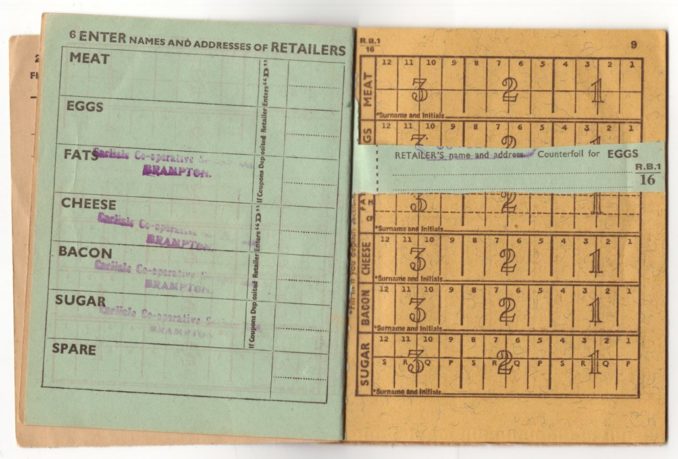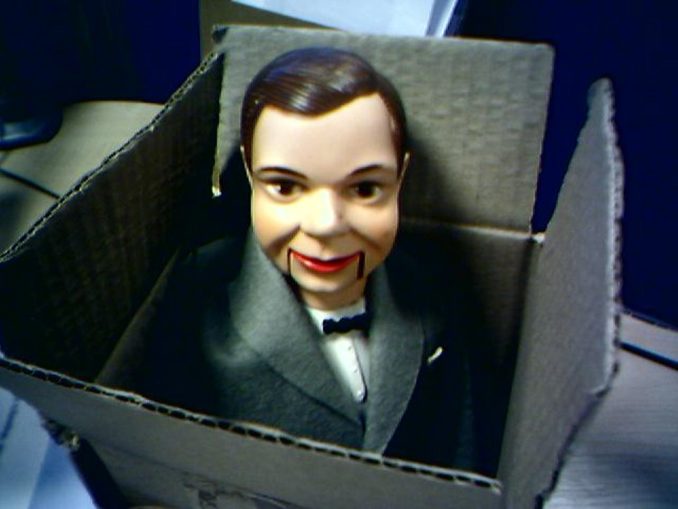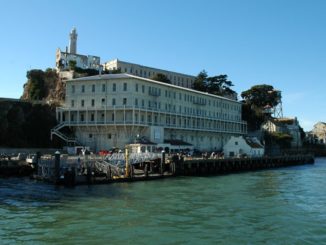Post War Britain
I loved Christmas as a child: I would guess most of us did, but I am amazed and humbled when I look back at how much was achieved with how little by my family, all of whom will now for ever be silent. I apologise in advance to them and to you for anything I may have forgotten or misremembered: it was a long time ago, and many things have happened in my life in the years between. Nevertheless, I felt it important to recall those gentler, simpler times before there is no-one left to do so.
I was born at the end of the War, when, it is not often realised, rationing and shortages became much more severe than they had been from 1939 to 1945 (for example, bread was rationed for the first time). I have read that there were two reasons for this: first, the USA withdrew support from the UK following the election of a Socialist Government and, secondly, the UK chose to divert increasing amounts of its own meagre supplies to support the many dispossessed people in mainland Europe.

Courtesy of Russell W. Barnes, fickr
My Grandparents’ Home
From my earliest years, we always spent Christmas Day at my maternal grandparents’ home, which seemed a very long walk to me as a child (it was probably about a mile, maybe less.) For ten years, I was the only child in the family, and I was allowed to sleep there overnight, which was an enormous treat for me, as, even though my grandmother looked after me on many week days, Christmas Day was the only time I was allowed this privilege.
The house, which was purchased by my grandparents sometime in the 1930s, was a semi, always entered by the front door, which opened on to a passage (called “the hall”). This lead to the “front room” (only for “best”) and a kitchen scullery with a small veranda attached, incorporating a “coal hole”. Upstairs, there were 2 bedrooms, a box room and a bathroom, and outside, the small garden was devoted to vegetables, as it had been since the start of the War.
The house was decorated with cheap paper garlands, primarily paper chains and concertina decorations, which were pulled out to extend them as far as possible. The much-used artificial Christmas tree sat proudly in the bay window of the front room, decorated with baubles which had all been acquired before the War (I still treasure two of them). I do not remember any lights, but small twisted candles were clipped to the ends of the branches, which were, understandably, never lit!
The layout of the kitchen was a recessed cupboard and sink separated by an open fire at one of the shorter ends: at the other short end was a door leading to the veranda and, next to it, a small chest of drawers on which proudly sat the wireless. Next to this was the door to the pantry, and, finally, the door back in to the hall. Down one of the longer sides, adjacent to the sink, was an electric cooker, a window, and (after 1953) a 12” Bush Television on a TV cupboard. The table, with two drop-down leaves, and chairs underneath, occupied the other long side of the room.
At first, the family consisted of my grandparents, my parents, my mother’s younger brother and me, but it was amazing to behold how, as the family expanded with the marriage of my uncle and the birth of my two cousins, my grandmother still managed to produce a wonderful meal in the same cramped conditions, and served it on the very same table.
Christmas Dinner
Being a traditional Yorkshire family, the first course was Yorkshire pudding, served on its own with gravy, but not just ordinary Yorkshire pudding. At Christmas, we also had “seasoned pudding”. For the keen chefs among you who haven’t tried this, it is easy to prepare if you can be bothered to make your own batter. All you do is add a modest amount of sage and onion stuffing to the batter before you put it in the oven, et voila! It is never going to rise like ordinary Yorkshire pudding, has a tendency to burn if you don’t keep a close eye on it, and is best made in a large dish, but, for me, it will always be one of the staples of Christmas.
Having taken the edge off everyone’s appetite (the purpose of Yorkshire pudding in God’s Own Country), we would then tuck into chicken with bread sauce and stuffing, served with vegetables from my grandfather’s garden, always including sprouts and roast potatoes. During WWII, the meat ration for an adult was the equivalent of two chops a week, and, as meat continued to be rationed for 8 years after I was born, I am unclear as to how the chicken was procured, but it always was. Maybe the secret was in the excess of sausages which we always had, as they had been taken off rationing in 1944, and maybe it helped that my grandfather was the manager of the local Co-op grocers.
The meal was rounded off with traditional Christmas pudding (made with much scrimping a year before) and rum sauce. There was no cheese board, as the only cheese available until 1954 was Government Cheddar, which was, frankly, disgusting. As was traditional in Yorkshire, it was eaten with Christmas cake. (Incidentally, I put my lifelong aversion to cheese down to this disgusting stuff that my mother persisted in trying to make me eat throughout my childhood, and which led to my enduring ability to be sick at will!)
There was, of course, no fruit bowl: we could have had apples or pears, but soft fruit was out of season and no-one had seen a grape or banana since the start of the War: more exotic fruits, such as kumquats or kiwi fruits, were not yet a gleam in top chefs’ eyes.
Christmas Games
After our Christmas “dinner”, we were allowed into the front room, where there were a few presents (but not many). There were no chocolates because sweet rationing did not end until 1953, but I do remember walnuts and hazelnuts in a bowl. The present I always had was a snow house. This was a cheap cardboard box illustrated to look like a house in the snow; inside was a selection of low-cost presents, such as you might find in cheap Christmas crackers today.
If you have ever wondered why your great aunt carefully preserves all the wrapping paper round her presents, you can blame WWII for that as well: paper was very scarce until well into the 50s. You can also thank the War for endless presents of soap, which was severely rationed in order to devote oils and fats to food production, and, hence, a very acceptable gift.
Then everyone’s attention turned to games. I remember we started with “Boy’s name, girl’s name etc.” beginning with a particular letter, which, as I recall, lead to fierce disputes. I still remember one occasion concerning the name of a country beginning with T. My grandmother, who had left school at 12, and, unlike my grandfather, had never felt the inclination to open a book since then, insisted that her contribution, “Thornhill” (the village where she had been born), qualified “because it was in the country”.
When the “words beginning with” game broke up in acrimony, we would play cards for matchsticks on a green baize topped folding table. I no longer remember the detail, but I have distinct memories of playing Pontoon and Whist from an early age. Thankfully, these early Christmases got any betting urges I may have had out of my system: other families may have played Snap, but we played for money (or, more accurately, matches!).
My favourite game was what I called “The Christmas balls game”, because it only ever appeared at Christmas. It was very old, and I suspect may have been Victorian, as it was conspicuously better made than most things around. As I have forgotten what it was really called, if I ever knew, and can find no reference to it today, I will try and describe it to you. A round base had around 8 slim metal stands on it, each one with a circular top with a differently coloured hard ball loosely tied on to it. Attached to the base by a leather (or similar) narrow strap was a top. This was wound up by one of the men, and let go. “Why?”, you may well cry. Each player chose a ball, and the winner was the one whose ball remained on its stand the longest. Simple games for simpler times!
Christmas Tea
We seemed to be constantly eating, and tea came round sooner than any child would like. I have limited memory of what we ate, but I guess it must have been corned beef and Spam (the tinned cooked meat staples at the time), along with any leftover chicken. There was, of course, no salad, as it was out of season, but I remember pickled beetroot, mixed pickles and little silver onions, which I loved.
No doubt, there was more disgusting Government Cheddar, for those who could stomach it, as well as more Christmas cake and mince pies. I doubt if we had tinned fruit, as it was still on coupons.
Although the adults had been welcomed with a glass of sherry, I think it was after tea that the adults started to drink alcohol more seriously, and I have to confess that I do not recall any shortage of booze, although I have read that, with the exception of beer, it was difficult to get hold of. Maybe my grandfather’s membership of the local golf club helped!
The Arrival of my Aunt
Sometime in the early 50’s, my uncle met the lady who would become my aunt. My grandmother, naturally, was convinced that she was not good enough for her little boy, but, for me, she was an absolute star. She was not only another adult to pay me attention, but she also had another exciting skill; she was an amateur ventriloquist with a doll called “Reggie”. I could watch her endlessly, in fact until she became bored with it – to be fair, long after she became totally fed up.
I would be duly chastised by my father for pestering my aunt-to-be, but my grandfather would always come to my aid with the immortal words, “She’s nobbut a bairn.”

Courtesy of Big Al Davies, flickr
My aunt’s doll closely resembled Archie Andrews, who, no doubt surprisingly for younger readers, was a big radio hit. Yes, truly, a ventriloquist of radio fame! As I’ve said before, simpler pleasures for simpler times!
In due course, my Aunt and Uncle married, and moved to Scotland, where I visited them every year with my grandmother. When they returned to Yorkshire, my cousin was born, followed three years later by her sister.
The End of Innocence
By the time both my two cousins were around, I was 13 years old, and it would be the last Christmas Day I would spend with my grandparents. I needed to look after a couple of pesky toddlers like a hole in the head. I was no longer a child: I had become that new thing, a teenager, with all the selfishness associated with the breed. The world had moved on, and I moved on with it, without a backward glance. Rationing was a distant memory, people had money in their pockets they could never have dreamt of ten years earlier, and the age of consumerism had arrived. It was the end of innocence, and the world would never be the same again.
Epilogue
All my relatives, apart from my cousins, have been dead for some years, and I recently asked one of my cousins what had happened to Reggie. “We got a good price for him on eBay”, she replied.
Dear Reader, I wept.
© Chrissie 2021



